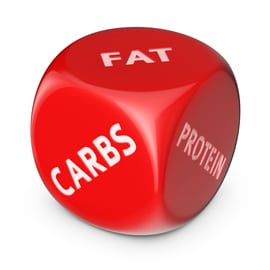Carbohydrates 101
When it comes to carbohydrates, many people have mixed emotions or simply do not understand the role they play in maintaining a healthy diet. Some say all carbohydrates are bad, while others tell you they’re okay as long as they’re eaten in moderation. When you’re trying to lose weight, how are you supposed to know how much is too much and which carbs are the right ones to be eating?
How to separate bad carbohydrates from good as you lose weight.
 When it comes to carbohydrates, many people have mixed emotions or simply do not understand the role they play in maintaining a healthy diet. Some say all carbohydrates are bad, while others tell you they’re okay as long as they’re eaten in moderation. When you’re trying to lose weight, how are you supposed to know how much is too much and which carbs are the right ones to be eating?
When it comes to carbohydrates, many people have mixed emotions or simply do not understand the role they play in maintaining a healthy diet. Some say all carbohydrates are bad, while others tell you they’re okay as long as they’re eaten in moderation. When you’re trying to lose weight, how are you supposed to know how much is too much and which carbs are the right ones to be eating?
Many Americans get caught up counting calories and monitoring their intake of vitamins and nutrients to adhere to the FDA recommended daily dosages, but the fact is no one really ever becomes healthy by simply memorizing calorie or food pyramid charts.
Being healthy and eating the right foods to lose weight begins with your mind-set.
The vast majority of Americans “eat out of their heads,” meaning they don’t naturally rely on their bodily sensations to prompt their eating habits. Instead, they allow their minds to rule their diets by falling prey to advertising tactics, suggestive selling in restaurants, diet fads and diet scares. Today, the cheapest calories for sale are simple carbohydrates or simple sugars—which results in the shocking reality that the average American consumes 156 pounds of unnecessary sugar each year.
The trick to taking control of your eating habits lies within your ability to bring your mind back in control of your diet—especially in a world where we are exposed to hundreds of subliminal messages and sneaky advertising tricks every single day.
America’s carbohydrate abuse falls within four brain-related categories:
- Junk satisfaction or a brief sugar high
- Taste addiction or craving of sugary foods when you’re not even hungry
- Disconnection from bodily signals or not knowing when your stomach is truly full
- Reaching for emotional surrogates or eating in order to feel better
So how can you straighten out this otherwise dysfunctional relationship with carbohydrates?
It’s simple—arm yourself with all of the facts surrounding carbohydrates and you will be more knowledgeable and aware of when to eat them and which kinds to eat while not harming your weight loss efforts. There are three main types of carbohydrates: simple sugars or simple carbohydrates, starch and fiber. These categories can be simplified even further to just simple and complex carbohydrates.
In short, simple carbohydrate or simple sugars occur naturally in vegetables, milk and other unprocessed foods. Their downfall is their ability to rapidly raise and decrease your blood sugar levels, which can leave you feeling hungry faster and ultimately lead to overeating. On the other hand, complex carbohydrates remain in your digestive system for longer periods of time while providing a slow-burning energy to keep you fuller longer. All foods containing simple and complex carbohydrates can be ranked on the glycemic index to indicate how rapidly or intensely foods will elevate blood sugar levels.
Here are some low glycemic fruits and vegetables to add to your medical weight loss diet:
- Apples
- Bananas
- Oranges
- Blueberries
- Ginger
- Broccoli
- Spinach
- Zucchini
- Asparagus
- Cucumber
When you’re trying to lose weight, it’s best to consume foods on the lower end of the glycemic index as they are proven to prevent and even treat obesity, diabetes and cardiovascular disease. You and your mind are in control of your journey to a healthier lifestyle, so fine-tune your bodily senses and decipher when it’s truly appropriate to fuel up. When you do, make sure you reach for the healthy carbs or foods with a low glycemic ranking. However, remember to eat them in moderation and remain within your medical weight loss program’s dietary guidelines.



